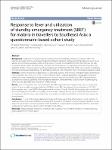Response to fever and utilization of standby emergency treatment (SBET) for malaria in travellers to Southeast Asia: a questionnaire-based cohort study
Vinnemeier, Christof D.
Rothe, Camilla
Kreuels, Benno
Addo, Marylyn M.
Vygen-Bonnet, Sabine
Cramer, Jakob P.
Rolling, Thierry
Background: Guidelines in several European countries recommend standby emergency treatment (SBET) for travellers to regions with low or medium malaria transmission instead of continuous chemoprophylaxis: travellers are advised to seek medical assistance within 24 h in case of fever and to self-administer SBET only if they are not able to consult a doctor within the time period specified. Data on healthcare-seeking behaviour of febrile travellers and utilization of SBET is however scarce as only two studies were performed in the mid-1990s. Since tourism is constantly increasing and malaria epidemiology has dramatically changed in the meantime more knowledge is urgently needed. Methods: Some 876 travellers to destinations in South and Southeast Asia with low or medium malaria transmission were recruited in the travel clinic of the University Medical Center Hamburg-Eppendorf. Demographic and travel-related data were collected by using questionnaires. Pre-travel advice was carried out and SBET was prescribed in accordance to national guidelines. Post-travel phone interviews were performed to assess health incidents during travel and individual responses of travellers to febrile illness. Results: Out of 714 patients who were monitored, 130 (18%) reported onset of fever during travel or 14 days after return. Of those travellers who reported fever, 100 (80%) carried SBET during travel. The vast majority of 79 (79%) febrile travellers who carried SBET did not seek medical assistance. Overall, 14 (14%) febrile patients who carried SBET and six (20%) patients who did not carry SBET took the correct measure (doctor visit or timely SBET administration) as a response to febrile illness, respectively. Only two travellers self-administered SBET, but both of them applied the wrong regimen. Conclusions: In view of declining malaria transmission and improving medical infrastructure in most countries of Southeast Asia and obvious obstacles concerning SBET as shown in this study the current strategy should be re-evaluated. Pre-travel advice concerning malaria in SEA should focus on appropriate mosquito bite protection and clearly emphasize the need to see a doctor within 24 h after onset of fever.
Files in this item
No license information

